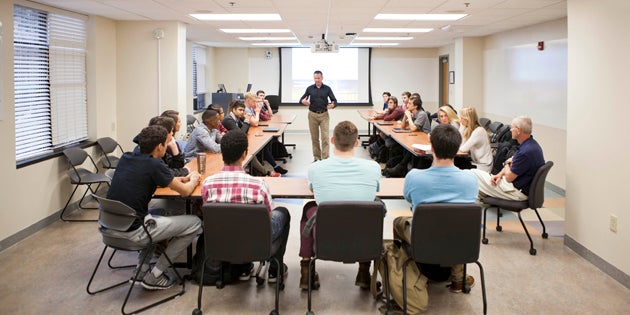A lot of billionaires launched their business from a garage (Steve Jobs and Jeff Bezos) or dorm room (Mark Zuckerberg). At the College of Charleston, you can do it in a classroom. Plus you’ll get money, mentors and more.
Two-dozen students have been hand-selected from more than 60 applicants as the first class of the ICAT program – the International Cross-curricular Accelerator for Technology. Working in teams of three, students will create globally scalable technology companies, while earning class credit.
“Each semester, students will form up to 16 companies,” explains Chris Starr, professor of information management and ICAT director in the School of Business. “That’s more than 300 companies in 10 years. The statistics would suggest there will be a million or billion dollar company formed at the College of Charleston in the next 10 years.”
APPLY: Find out how to apply to the College of Charleston.
How it works
Starr describes the program as experiential learning at the intersection of creativity, technology and entrepreneurship.
 When ramped up to full scale in spring 2016, 48 students will be chosen each semester from different majors across campus, emphasizing the cross-disciplinary feature of the tech accelerator. They will take a six-credit ICAT course that consists of a tech/computer science course and a business/entrepreneurship course, both designed to integrate creativity, business and technology.
When ramped up to full scale in spring 2016, 48 students will be chosen each semester from different majors across campus, emphasizing the cross-disciplinary feature of the tech accelerator. They will take a six-credit ICAT course that consists of a tech/computer science course and a business/entrepreneurship course, both designed to integrate creativity, business and technology.
Students will form teams of three, with one business student, one computer science student and one liberal arts and humanities student. Each team will be assigned an IT mentor and a business mentor from successful business and technical leaders in the Charleston area. Will Jamieson, a junior computer science major who has launched multiple successful companies while at the College of Charleston, will also mentor the teams this spring.
ARTICLE: Read more about how Will Jamieson launched several successful apps, including Yik Yak.
Each team must create between one and three MVPs (minimum viable products). Every time a team creates an MVP, they are awarded $500 to spend as they like. At the end of the semester, all the MVPs will be pitched to a team of Charleston-area entrepreneurs and the winning team will receive $10,000 to help that student group to grow their new company.
“It’s not the money or company value that matters,” Starr explains. “Most important is the entrepreneurial experience that comes through executing the theory. Even though students see ICAT as an accelerator for globally scalable tech companies, we’re actually a tech talent accelerator for the 21st century.”
Early success
An entrepreneurial background isn’t required to be part of the ICAT program, but many students have already jumped into the shark tank.
Two students formed AttendIT.today, which is an event and graduation management service. Two other teams of students have been working on product design – one using beacon technology and the other open source in 3D model design and printing.
graduation management service. Two other teams of students have been working on product design – one using beacon technology and the other open source in 3D model design and printing.
It isn’t just the students seeing early success. The ICAT program received a $250,000 grant from the S.C. Department of Commerce and other donors have stepped up to provide funding for travel and scholarships.
ARTICLE: Learn more about the grant from the Dept. of Commerce.
Being globally competitive
ICAT students are also eligible for two international opportunities.
The Estonia-Charleston Network Globally, Act Locally (NGAL) experience brings students from the College of Charleston, University of Tartu (Estonia) and Nebraska Wesleyan University together to form an international high tech company.
Students will travel to Estonia in March 2015 for a weeklong, entrepreneurship boot-camp. In June 2015, all students will participate in another weeklong boot-camp in Charleston to pitch and potentially launch their international companies. The NGAL experience is funded by the Harry and Reba Huge Foundation.
“The importance of the international emphasis of the accelerator cannot be overstated. In the new world of globally-scalable tech, customers, developers and funding are expected to be distributed across countries and cultures,” says Starr. “
The ICAT travel experience gives students the opportunity to travel to Estonia for a 10-day interview of creative, business and technical people in European’s hotbed of technology. The trip is planned for the summer of 2015.
APPLY: For the ICAT travel experience for summer 2015.
“We’ve done similar trips to California’s Silicon Valley with incredible results,” Starr notes. “Two students have landed jobs at Pandora and another student just accepted a position as a developer/engineer intern at Facebook. He said the trip inspired him, otherwise he never would have applied.”





